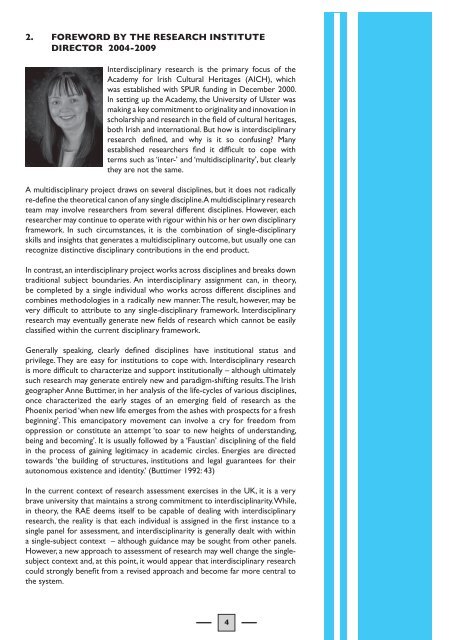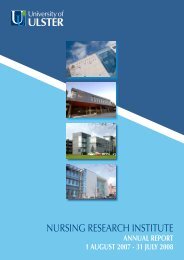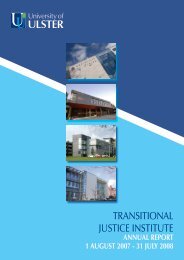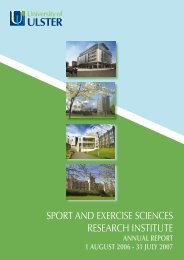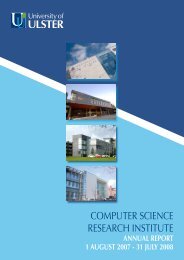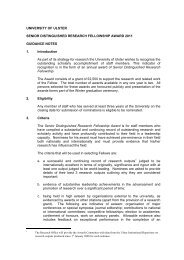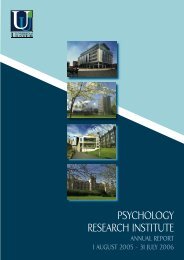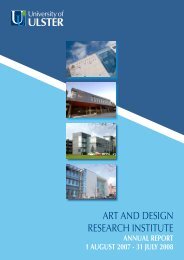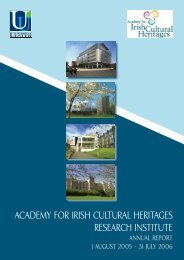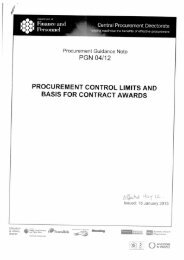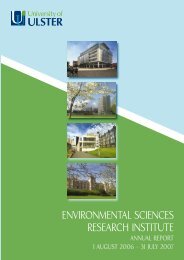academy for irish cultural heritages - Research - University of Ulster
academy for irish cultural heritages - Research - University of Ulster
academy for irish cultural heritages - Research - University of Ulster
Create successful ePaper yourself
Turn your PDF publications into a flip-book with our unique Google optimized e-Paper software.
2. Foreword by the <strong>Research</strong> InstituteDirector 2004-2009Interdisciplinary research is the primary focus <strong>of</strong> theAcademy <strong>for</strong> Irish Cultural Heritages (AICH), whichwas established with SPUR funding in December 2000.In setting up the Academy, the <strong>University</strong> <strong>of</strong> <strong>Ulster</strong> wasmaking a key commitment to originality and innovation inscholarship and research in the field <strong>of</strong> <strong>cultural</strong> <strong>heritages</strong>,both Irish and international. But how is interdisciplinaryresearch defined, and why is it so confusing? Manyestablished researchers find it difficult to cope withterms such as ‘inter-’ and ‘multidisciplinarity’, but clearlythey are not the same.A multidisciplinary project draws on several disciplines, but it does not radicallyre-define the theoretical canon <strong>of</strong> any single discipline. A multidisciplinary researchteam may involve researchers from several different disciplines. However, eachresearcher may continue to operate with rigour within his or her own disciplinaryframework. In such circumstances, it is the combination <strong>of</strong> single-disciplinaryskills and insights that generates a multidisciplinary outcome, but usually one canrecognize distinctive disciplinary contributions in the end product.In contrast, an interdisciplinary project works across disciplines and breaks downtraditional subject boundaries. An interdisciplinary assignment can, in theory,be completed by a single individual who works across different disciplines andcombines methodologies in a radically new manner. The result, however, may bevery difficult to attribute to any single-disciplinary framework. Interdisciplinaryresearch may eventually generate new fields <strong>of</strong> research which cannot be easilyclassified within the current disciplinary framework.Generally speaking, clearly defined disciplines have institutional status andprivilege. They are easy <strong>for</strong> institutions to cope with. Interdisciplinary researchis more difficult to characterize and support institutionally – although ultimatelysuch research may generate entirely new and paradigm-shifting results. The Irishgeographer Anne Buttimer, in her analysis <strong>of</strong> the life-cycles <strong>of</strong> various disciplines,once characterized the early stages <strong>of</strong> an emerging field <strong>of</strong> research as thePhoenix period ‘when new life emerges from the ashes with prospects <strong>for</strong> a freshbeginning’. This emancipatory movement can involve a cry <strong>for</strong> freedom fromoppression or constitute an attempt ‘to soar to new heights <strong>of</strong> understanding,being and becoming’. It is usually followed by a ‘Faustian’ disciplining <strong>of</strong> the fieldin the process <strong>of</strong> gaining legitimacy in academic circles. Energies are directedtowards ‘the building <strong>of</strong> structures, institutions and legal guarantees <strong>for</strong> theirautonomous existence and identity.’ (Buttimer 1992: 43)In the current context <strong>of</strong> research assessment exercises in the UK, it is a verybrave university that maintains a strong commitment to interdisciplinarity. While,in theory, the RAE deems itself to be capable <strong>of</strong> dealing with interdisciplinaryresearch, the reality is that each individual is assigned in the first instance to asingle panel <strong>for</strong> assessment, and interdisciplinarity is generally dealt with withina single-subject context – although guidance may be sought from other panels.However, a new approach to assessment <strong>of</strong> research may well change the singlesubjectcontext and, at this point, it would appear that interdisciplinary researchcould strongly benefit from a revised approach and become far more central tothe system.4


